Unit 5 Our school life Topic 1 I usually come to school by subway. Section C 授课课件
文档属性
| 名称 | Unit 5 Our school life Topic 1 I usually come to school by subway. Section C 授课课件 | 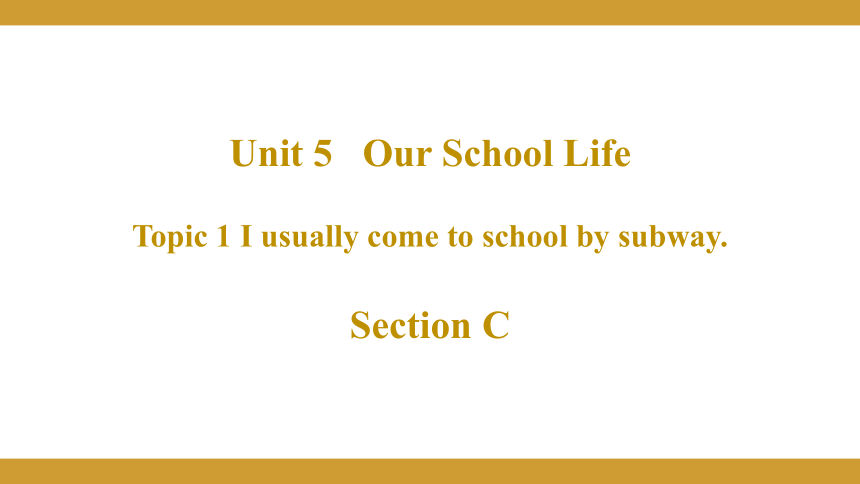 | |
| 格式 | pptx | ||
| 文件大小 | 17.7MB | ||
| 资源类型 | 试卷 | ||
| 版本资源 | 仁爱科普版 | ||
| 科目 | 英语 | ||
| 更新时间 | 2022-12-27 14:00:54 | ||
图片预览


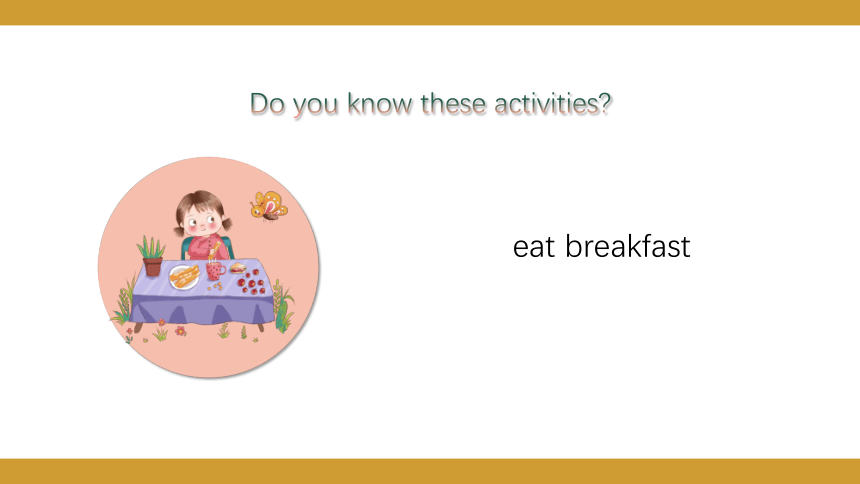
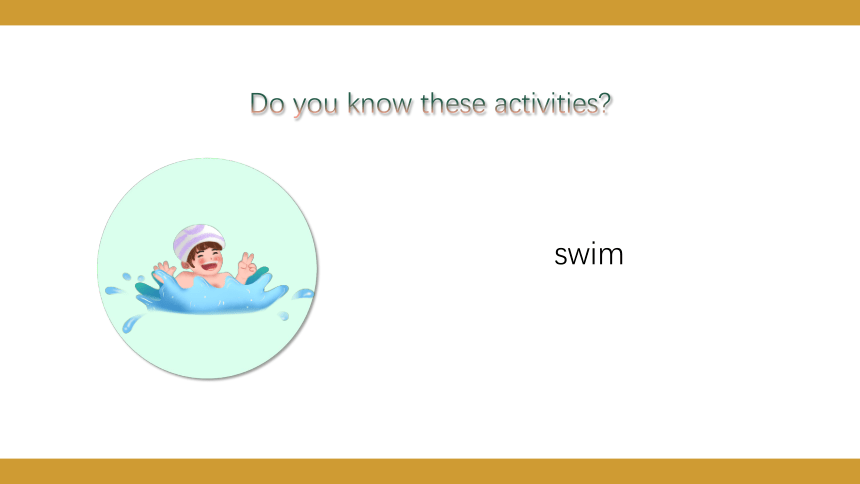
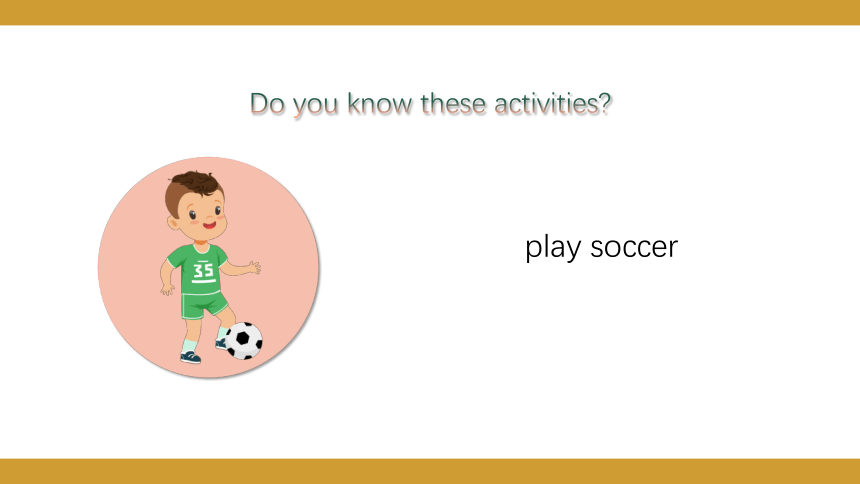




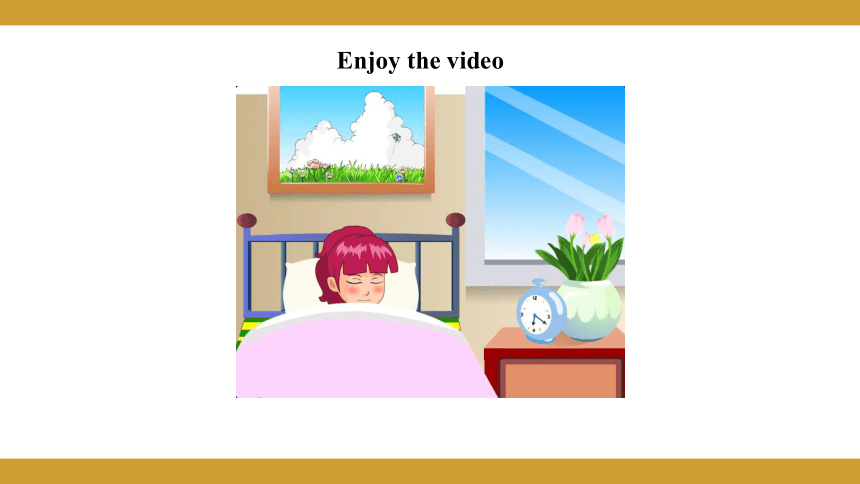
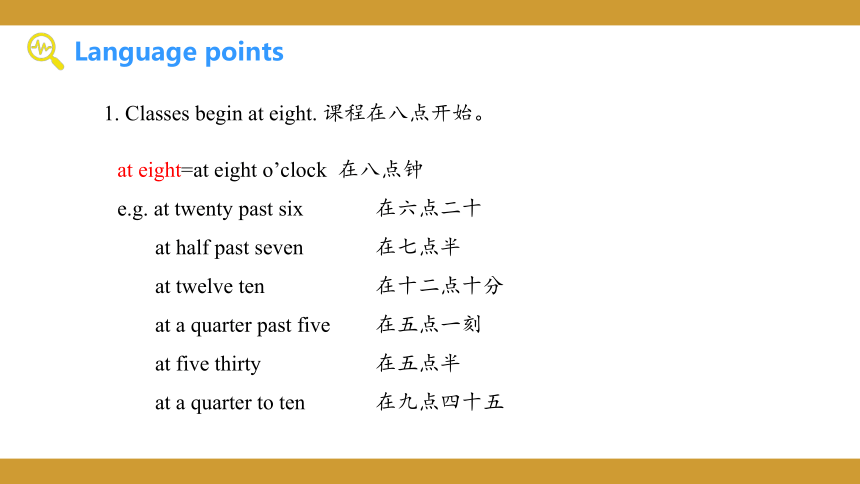
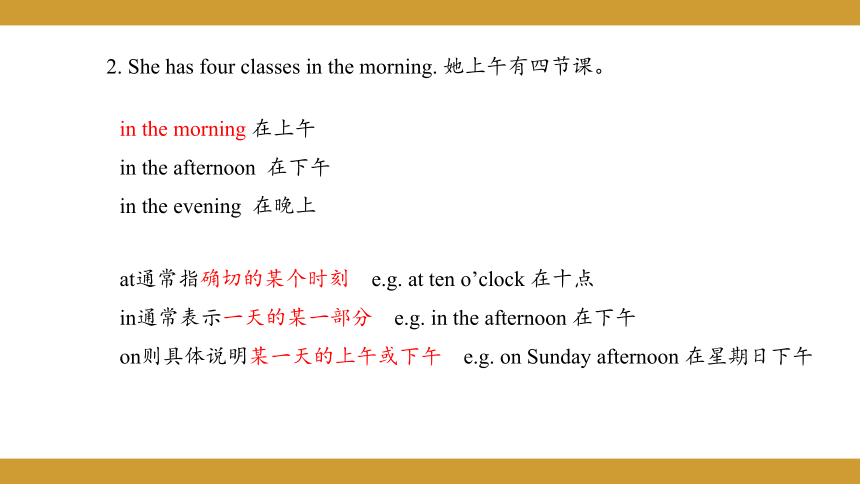
文档简介
(共32张PPT)
Unit 5 Our School Life
Topic 1 I usually come to school by subway.
Section C
Do you know these activities
get up
eat breakfast
Do you know these activities
Do you know these activities
swim
play soccer
Do you know these activities
Do you know these activities
play basketball
go to bed
Do you know these activities
What time do you usually get up And what time do you usually go to school What do you like to do after school Let’s look at Jane’s Day.
“
“
Jane’s Day
Jane usually gets up at twenty past six. At seven o’clock, she has breakfast with her parents. She goes to school by bus at half past seven. Classes begin at eight. She has four classes in the morning.
She has lunch at school at twelve ten. She has two classes in the afternoon. After school, she often plays soccer with her classmates. At a quarter past five, she takes the subway home.
She gets home at five thirty and has dinner at seven o’clock. After dinner, she often does her homework and then watches TV for a short time. She goes to bed at about a quarter to ten.
1a Read and understand.
Enjoy the video
1. Classes begin at eight. 课程在八点开始。
at eight=at eight o’clock 在八点钟
e.g. at twenty past six 在六点二十
at half past seven 在七点半
at twelve ten 在十二点十分
at a quarter past five 在五点一刻
at five thirty 在五点半
at a quarter to ten 在九点四十五
2. She has four classes in the morning. 她上午有四节课。
in the morning 在上午
in the afternoon 在下午
in the evening 在晚上
at通常指确切的某个时刻 e.g. at ten o’clock 在十点
in通常表示一天的某一部分 e.g. in the afternoon 在下午
on则具体说明某一天的上午或下午 e.g. on Sunday afternoon 在星期日下午
Read passage in 1a carefully and complete the table.
Time Activity
6:20 a.m. gets up
has breakfast
7:30 a.m.
12:10 p.m.
after school
gets home
after dinner
goes to bed
7:00 a.m.
goes to school
has lunch
plays soccer
5:30 p.m.
does her homework
9:45 p.m.
1. How does Jane usually go to school
2. How many classes does she have in the afternoon
3. Does Jane usually go home by bus
4. When does Jane go to bed
Read the passage and answer the questions.
She usually goes to school by bus.
She has two classes in the afternoon.
No, she doesn’t. She usually takes the subway home.
She goes to bed at about a quarter to ten.
1b Work in groups of three. Discuss the following pictures and retell the passage in 1a.
Jane usually gets up at twenty past six.
At seven o’clock, she has breakfast with her parents.
She goes to school by bus at half past seven.
Classes begin at eight. She has four classes in the morning.
She has lunch at school at twelve ten.
She has two classes in the afternoon.
After school, she often plays soccer with her classmates.
At a quarter past five, she takes the subway home.
She gets home at five thirty and has dinner at seven o’clock.
After dinner, she often does her homework.
And then watches TV for a short time.
She goes to bed at about a quarter to ten.
1c Talk with your partner about your day with the help of 1a. Then report it to the class.
I usually get up at … in the morning. At … o’clock, I have breakfast …
… is my friend/classmate. He/
She usually gets up at … in the morning …
2 Ask and answer questions with the following questions.
Han Qing
play soccer
play basketball
What does Han Qing usually do after school
He usually plays soccer, but he doesn’t play basketball.
Wen Wei
go swimming
go fishing
What does Wen Wei usually do after school
He usually goes swimming, but he doesn’t go fishing.
Ellen
listen to music
watch TV
What does Ellen usually do after school
She usually listens to music, but she doesn’t watch TV.
Wang Junfeng
do his homework
go to the park
What does Wang Junfeng usually do after school
He usually does his homework, but he doesn’t go to the park.
—What does Han Qing usually do after school 韩青放学后通常做什么?
—He usually plays soccer, but he doesn’t play basketball. 他经常踢足球,但是他不打篮球。
What do/does...usually do 某人通常做什么?
主语+usually+动词原形/三单… 某人通常......
e.g. —What does Tom usually do after class 汤姆下课后通常做什么?
—He usually listens to music. 他通常听音乐。
Example:
A: Do you often read books in the library
B: Yes, I do. /No, I don’t.
A: How often do you come to the library
B: Three times a week.
3 Work in pairs. Make up new conversations with the words and phrases in the box.
Activity Frequency
meet friends watch TV listen to music read books cook go to the zoo play soccer once a week twice a week three times a week
very often
every day seldom
never
—How often do you come to the library 你多久来一次图书馆?
—Three times a week. 一周三次。
(1) how often意为“多久一次”,对动作发生的频率进行提问。
回答时常用到频度副词often、usually、sometimes、seldom、never及表示频度的短语once a week、twice a month等。
(2) three times意为“三次”。
一次用once,两次用twice,
三次或三次以上用“数词+times”表示。
4a Read and write the words.
read
feet
head
great
bridge
4b Listen to the sentences and mark the rising tone and the falling tone.
1. The Chinese judge needs cheese, meat and bread.
2. The girl in jeans can cook great beef.
words: begin, after, basketball, swim,
listen, music, library, week, once, twice
some phrases: at school, go to bed, listen to music, play basketball / soccer
some sentences:
What do you usually do after school
一、根据句意和首字母提示,完成句子
1. There are seven days in a w .
2. —How do you like your school l
—Very nice. I like reading books there.
3. Jack often gets up at six in the morning and goes to b at nine o’clock in the evening.
4. —What time do you come to school
—I usually come to school at 7:00. Classes b at 8:10.
5. A dinner, Jerry usually goes out for a walk and then does his homework at home.
eek
ife
ed
egin
fter
二、根据汉语意思,完成句子
1. Where do you usually (吃早餐)
2. We go swimming in the pool (一周两次)
3. Do you often read books (在图书馆)
have/eat breakfast
twice a week
in the library
三、短文填空。根据首字母提示及短文内容,在空白处填上恰当的词
Everybody(每个人) wants to be healthy(健康的). You know 1. f is very important(重要) to us. There are 2. m kinds(种,类) of healthy food. You can have bananas, apples, oranges and 3. v . They are good for you. But don’t 4. e too much chocolate(巧克力). It’s not good for you. I think Chinese food is healthy. My 5. f food is jiaozi.
ood
any
egetable
at
avorite
1. Review the words, phrases and sentences.
2. Review the present simple tense.
3. Talk about the daily activities.
4. Finish exercises of Unit 5 Topic 1 Section C.
Unit 5 Our School Life
Topic 1 I usually come to school by subway.
Section C
Do you know these activities
get up
eat breakfast
Do you know these activities
Do you know these activities
swim
play soccer
Do you know these activities
Do you know these activities
play basketball
go to bed
Do you know these activities
What time do you usually get up And what time do you usually go to school What do you like to do after school Let’s look at Jane’s Day.
“
“
Jane’s Day
Jane usually gets up at twenty past six. At seven o’clock, she has breakfast with her parents. She goes to school by bus at half past seven. Classes begin at eight. She has four classes in the morning.
She has lunch at school at twelve ten. She has two classes in the afternoon. After school, she often plays soccer with her classmates. At a quarter past five, she takes the subway home.
She gets home at five thirty and has dinner at seven o’clock. After dinner, she often does her homework and then watches TV for a short time. She goes to bed at about a quarter to ten.
1a Read and understand.
Enjoy the video
1. Classes begin at eight. 课程在八点开始。
at eight=at eight o’clock 在八点钟
e.g. at twenty past six 在六点二十
at half past seven 在七点半
at twelve ten 在十二点十分
at a quarter past five 在五点一刻
at five thirty 在五点半
at a quarter to ten 在九点四十五
2. She has four classes in the morning. 她上午有四节课。
in the morning 在上午
in the afternoon 在下午
in the evening 在晚上
at通常指确切的某个时刻 e.g. at ten o’clock 在十点
in通常表示一天的某一部分 e.g. in the afternoon 在下午
on则具体说明某一天的上午或下午 e.g. on Sunday afternoon 在星期日下午
Read passage in 1a carefully and complete the table.
Time Activity
6:20 a.m. gets up
has breakfast
7:30 a.m.
12:10 p.m.
after school
gets home
after dinner
goes to bed
7:00 a.m.
goes to school
has lunch
plays soccer
5:30 p.m.
does her homework
9:45 p.m.
1. How does Jane usually go to school
2. How many classes does she have in the afternoon
3. Does Jane usually go home by bus
4. When does Jane go to bed
Read the passage and answer the questions.
She usually goes to school by bus.
She has two classes in the afternoon.
No, she doesn’t. She usually takes the subway home.
She goes to bed at about a quarter to ten.
1b Work in groups of three. Discuss the following pictures and retell the passage in 1a.
Jane usually gets up at twenty past six.
At seven o’clock, she has breakfast with her parents.
She goes to school by bus at half past seven.
Classes begin at eight. She has four classes in the morning.
She has lunch at school at twelve ten.
She has two classes in the afternoon.
After school, she often plays soccer with her classmates.
At a quarter past five, she takes the subway home.
She gets home at five thirty and has dinner at seven o’clock.
After dinner, she often does her homework.
And then watches TV for a short time.
She goes to bed at about a quarter to ten.
1c Talk with your partner about your day with the help of 1a. Then report it to the class.
I usually get up at … in the morning. At … o’clock, I have breakfast …
… is my friend/classmate. He/
She usually gets up at … in the morning …
2 Ask and answer questions with the following questions.
Han Qing
play soccer
play basketball
What does Han Qing usually do after school
He usually plays soccer, but he doesn’t play basketball.
Wen Wei
go swimming
go fishing
What does Wen Wei usually do after school
He usually goes swimming, but he doesn’t go fishing.
Ellen
listen to music
watch TV
What does Ellen usually do after school
She usually listens to music, but she doesn’t watch TV.
Wang Junfeng
do his homework
go to the park
What does Wang Junfeng usually do after school
He usually does his homework, but he doesn’t go to the park.
—What does Han Qing usually do after school 韩青放学后通常做什么?
—He usually plays soccer, but he doesn’t play basketball. 他经常踢足球,但是他不打篮球。
What do/does...usually do 某人通常做什么?
主语+usually+动词原形/三单… 某人通常......
e.g. —What does Tom usually do after class 汤姆下课后通常做什么?
—He usually listens to music. 他通常听音乐。
Example:
A: Do you often read books in the library
B: Yes, I do. /No, I don’t.
A: How often do you come to the library
B: Three times a week.
3 Work in pairs. Make up new conversations with the words and phrases in the box.
Activity Frequency
meet friends watch TV listen to music read books cook go to the zoo play soccer once a week twice a week three times a week
very often
every day seldom
never
—How often do you come to the library 你多久来一次图书馆?
—Three times a week. 一周三次。
(1) how often意为“多久一次”,对动作发生的频率进行提问。
回答时常用到频度副词often、usually、sometimes、seldom、never及表示频度的短语once a week、twice a month等。
(2) three times意为“三次”。
一次用once,两次用twice,
三次或三次以上用“数词+times”表示。
4a Read and write the words.
read
feet
head
great
bridge
4b Listen to the sentences and mark the rising tone and the falling tone.
1. The Chinese judge needs cheese, meat and bread.
2. The girl in jeans can cook great beef.
words: begin, after, basketball, swim,
listen, music, library, week, once, twice
some phrases: at school, go to bed, listen to music, play basketball / soccer
some sentences:
What do you usually do after school
一、根据句意和首字母提示,完成句子
1. There are seven days in a w .
2. —How do you like your school l
—Very nice. I like reading books there.
3. Jack often gets up at six in the morning and goes to b at nine o’clock in the evening.
4. —What time do you come to school
—I usually come to school at 7:00. Classes b at 8:10.
5. A dinner, Jerry usually goes out for a walk and then does his homework at home.
eek
ife
ed
egin
fter
二、根据汉语意思,完成句子
1. Where do you usually (吃早餐)
2. We go swimming in the pool (一周两次)
3. Do you often read books (在图书馆)
have/eat breakfast
twice a week
in the library
三、短文填空。根据首字母提示及短文内容,在空白处填上恰当的词
Everybody(每个人) wants to be healthy(健康的). You know 1. f is very important(重要) to us. There are 2. m kinds(种,类) of healthy food. You can have bananas, apples, oranges and 3. v . They are good for you. But don’t 4. e too much chocolate(巧克力). It’s not good for you. I think Chinese food is healthy. My 5. f food is jiaozi.
ood
any
egetable
at
avorite
1. Review the words, phrases and sentences.
2. Review the present simple tense.
3. Talk about the daily activities.
4. Finish exercises of Unit 5 Topic 1 Section C.
同课章节目录
- Unit 5 Our school life
- Topic 1 I usually come to school by subway.
- Topic 2 A few students are running around the play
- Topic 3 My school life is very interesting.
- Unit 6 Our local area
- Topic 1 Is there a computer in your study?
- Topic 2 My home is in an apartment building.
- Topic 3 Which is the way to the hospital?
- Review of Units 5-6
- Unit 7 The Birthday
- Topic 1 When is your birthday?
- Topic 2 Can you sing an English song?
- Topic 3 Everyone had a good time.
- Unit 8 The seasons and the Weathe
- Topic 1 What's the weather like in summer?
- Topic 2 The summer holidays are coming.
- Topic 3 Let’s celebrate!
- Review of Units 7-8
- 旧版资料
- Unit 5 Our School Life
- Unit 6 Our Local Area
- Unit 7 The Birthday
- Unit 8 The seasons and the Weathe
- Unit 7 Celebrating the Birthday(老版本)
